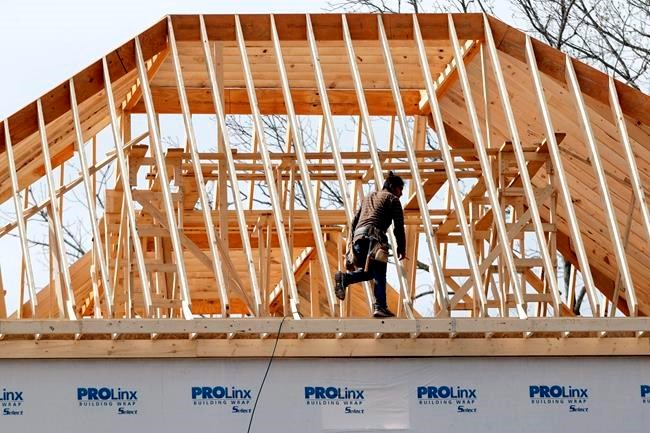SILVER SPRING, Md. — Construction of U.S. homes jumped 17.3% in June as some states reopened, but the pace still lags last year after this spring's massive slowdown in building activity due to the coronavirus outbreak.
The Commerce Department reported Friday that new homes were started at a seasonally adjusted annual rate of 1,186,000 in June after a modest recovery in May followed steep declines in April and March. Even after a second straight month of increases, including an upward revision for May, construction activity remains 4% below last year’s pace.
Applications for building permits, a good indication of future activity, rose 2.1% to 1.24 million units.
It had been hoped that the lowest mortgage rates in five decades would drive a housing boom. However, surging infections in the South, typically one of the most active construction markets, has put new projects at risk.
For example, it wasn't until June 26 that Florida closed its bars again after the state recorded a record 8,942 new cases of COVID-19. The state has repeatedly set new records since.
“We look for strong demand, improved homebuilder confidence, and an ongoing shortage of supply to support growth in housing starts over the rest of the year, but downside risks are increasing due to the resurgence in Covid-19 cases,” said Nancy Vanden Houten, lead U.S. financial economist at Oxford Economics. The South and West, which are seeing the largest rise in cases, accounted for about 75% of June housing starts, she said.
Regionally, construction rose everywhere but in the West, where it declined 7.5%, but that was after May's massive increase of 69.8%. In June, the Northeast led the way, with construction skyrocketing 114.3%, followed by the Midwest where it rose 29.3%. In the South, where coronavirus cases are spiking, starts rose 20.2%.
On Thursday, the National Association of Home Builders/Wells Fargo survey of builder confidence jumped for the second straight month in July to a reading of 72, near pre-pandemic levels. Any reading above 50 indicates a positive market. The index had plunged 42 points in April to a reading of 30, the largest single monthly change in the history of the survey.
Mortgage buyer Freddie Mac reported Thursday that the average rate on the 30-year home loan fell this week to 2.98% from 3.03% last week. These are the lowest levels since Freddie Mac began tracking averages in 1971, and under normal circumstances would push buyers into the market.
Yet the pandemic upended the jobs market and though there has been some improvement compared with earlier this year, the Labor Department reported Thursday that more than a million Americans sought unemployment benefits for the 17th consecutive week. Layoffs in places like Florida, Georgia and California rose by tens of thousands of people.
There had been hope early this month that the country had made it through the worst of the pandemic, but that optimism has been shaken with the rising number of infected Americans.
Matt Ott, The Associated Press



